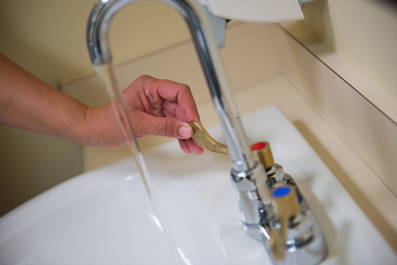 Cleanzine: your weekly cleaning and hygiene industry newsletter 18th April 2024 Issue no. 1110
Cleanzine: your weekly cleaning and hygiene industry newsletter 18th April 2024 Issue no. 1110
Your industry news - first
The original and best - for over 20 years!
We strongly recommend viewing Cleanzine full size in your web browser. Click our masthead above to visit our website version.
Hospital invests in bacteria-killing copper to reduce infections
 Pullman Regional Hospital, a level IV trauma centre in Washington State, has become an early adopter of antimicrobial copper after studies found that the age-old metal could continuously kill deadly bacteria.
Pullman Regional Hospital, a level IV trauma centre in Washington State, has become an early adopter of antimicrobial copper after studies found that the age-old metal could continuously kill deadly bacteria.
The hospital has installed copper components throughout its facility as another way of reducing hospital-acquired infections and keeping patients safe.
Each year, 2 million people in the US alone are diagnosed with a hospital-acquired infection and nearly 100,000 people die. These infections are caused by common bacteria such as E. coli, MRSA, C. diff, CRE and VRE.
"It is a very serious problem," says Ed Harrich, the director of surgical services for Pullman Regional Hospital. "I think every hospital across the nation is doing everything they can to try to deal with it the best that they can. But there's bio burden on everything and people aren't good at hand washing and there's cross-contamination everywhere you go."
Through a Patient Safety Challenge grant administered by the Copper Development Association, Pullman was able to purchase and install the following copper hardware throughout the 95,000sq.ft facility: faucet levers on 40 basins in the public washrooms found in patient rooms and hallway basins, handles for the IV poles used in the BirthPlace, ICU and Medical Surgery Unit, and disabled access buttons for double doors.
"By replacing the most touched surfaces in the hospital, Pullman is making an easy change to ensure its patients' safety and satisfaction," says Adam Estelle, a project engineer with CDA. "Bacteria can spread rapidly even in the most sterile locations where hand washing and surface disinfection are common practices. The beauty of copper touch surfaces is that they do not require any special cleaning, are safe to use and provide protection 24/7."
In 2008, an intensive US study funded by the US Department of Defence was launched to investigate the efficacy of antimicrobial copper. The study conducted inside the Intensive Care Units of three US hospitals proved that copper touch surfaces continuously reduced harmful bacteria and also reduced healthcare-acquired infection rates by 58%.
While the materials used for touch surfaces are often overlooked as opportunities to improve patient safety during the hospital design process, installing copper adds another layer of infection prevention into the facility. Antimicrobial copper products are highly durable and can last for decades.
Retrofitting a hospital with antimicrobial copper is an investment in patient safety with long-term benefits that far outweigh the upfront costs.
Today more than two dozen US manufacturers are producing antimicrobial copper components - everything from door handles, stair handrails, grab bars, sinks, carts and other specialty instrument trays. With several different copper alloys to choose from, products can exhibit the warm tones of brushed nickel, the colder white of stainless steel, the warm yellows of brass and bronze, or the traditional red of copper.
Pullman plans to install more than 420 copper cabinet pulls throughout the hospital in the coming weeks and months. Eventually, the administration would like to add countertops, the armrests of chairs, bed rails and bed handles made of copper.
"We're excited," says Jeannie Eylar, R.N., chief clinical officer for Pullman Regional Hospital. "We feel like we're on the right path...and we feel like copper is helping us achieve the outcome that we want."
The scientific proof that copper can now save lives provides hope for the future - even beyond hospitals.
www.antimicrobialcopper.com
www.pullmanregional.org
27th November 2014







